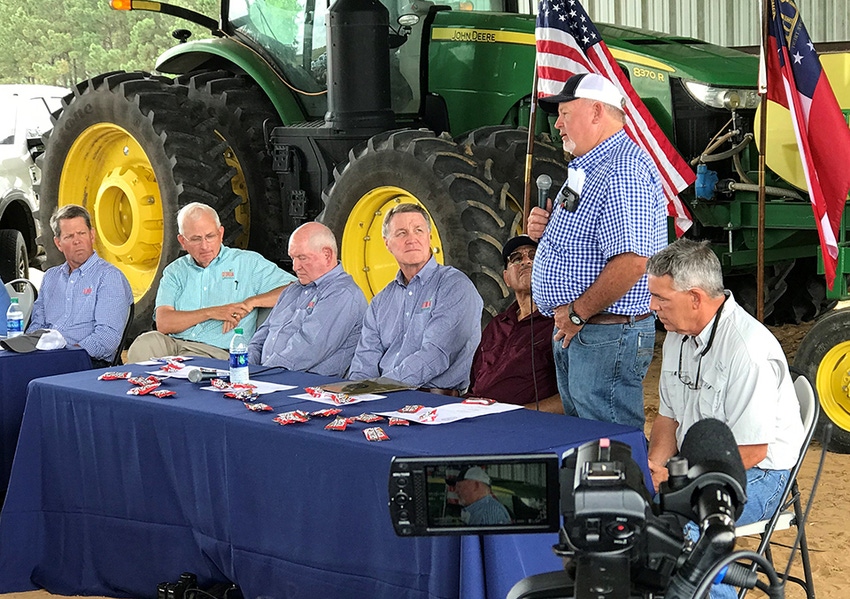
About 150 prominent farmers, agribusinessmen and ag lenders assembled June 7 to listen to influential agricultural policymakers discuss disaster funding, patience, tenacity, late-night texts, flexibility, gratitude and shamefulness.
Behind the farm headquarters of Bart Davis in Doerun, Ga., under the open-air steel building, side by side along joined folding tables sat U.S. Secretary of Agriculture Sonny Perdue, U.S. Senator David Perdue, Georgia Governor Brian Kemp, U.S. Congressman Austin Scott, U.S. Congressman Sanford Bishop, Georgia Commissioner of Agriculture Gary Black, Bart Davis, the chairman of the Georgia Cotton Commission, Dick Minor, vegetable farmer and former president of the Georgia Fruit and Vegetable Growers Association, and Hank Jester, an insurance agency owner.
It was a lot of big-time folks congregating in a small south Georgia town, a town with a population of about 750 if nobody is on vacation. Storm clouds circled and promised good showers for the next several days. It hadn’t rained in the region in well over a month. It was shaping up to be a good week for farmers in the area. They needed one.
The day before on the 75th anniversary of D-Day, on Air Force One, President Donald Trump signed into law a $19 billion supplemental disaster relief package, which included $3 billion for U.S. agricultural loses due to flooding and hurricanes in 2018 and 2019. The package contained aid, too, for blueberry and peach farmers who lost out due to freeze in 2017.
Senator Perdue, who maintains close ties to Trump, said the timing on the aid was ‘shameful’ and ‘ridiculous,’ coming some eight months after Hurricane Michael alone caused billions of dollars in damage to farmers across southeastern agriculture’s diverse landscape. He said the next longest time it took Congress to pass a disaster aid funding package was two months, and that was in response to Hurricane Sandy.
Details on delivery of the aid were not final at the time, but funding will go through the USDA Wildfires and Hurricanes Indemnity Program for farm bill covered commodities and block grants for non-covered commodities, such as pecans, through state departments of agriculture.
Language in the bill, Congressman Scott and Congressman Bishop said, provided the secretary the flexibility to administer the funding in a timely way. In an interview after the event, both Scott and Bishop said preliminary talks were underway in Washington to establish a reserve funding mechanism to pave the way for quicker federal disaster aid responses in the future.
The event carried the air of thankfulness: Those attending heaped praise on the Georgia delegation. Each policymaker in turn thanked each other for the persistent resolve it took to get the legislation passed in Washington’s dogmatic environment, where patience and impatience were used as tools to plow between the political ditches.
Commissioner Black joked about getting late-night texts from Congressman Scott, who in turn jokingly asked Black to delete the ones that might contain salty language about the frustrating legislative process.
A lot of lenders and farmers were banking on the promise that federal aid would be coming to the region in 2019, but as time spread on, fiscal pressure mounted. Lenders went out of their way, pulling all the tricks, to help keep the financial side of agriculture in the region running. Knowing something is on the way, said Davis, who lost 60 percent of his cotton crop due to Hurricane Michael, is a relief and will be a way for growers to grab a better handle on their debt load.
The event lasted about an hour. It was a victory lap of sorts. As the crowd and dignitaries scattered back to farms, offices and to halls of power, the storm clouds thickened over the area. It finally started to rain. Some locations received more than others, but all got some.
Good luck. Take care, and thanks for reading.
About the Author(s)
You May Also Like






